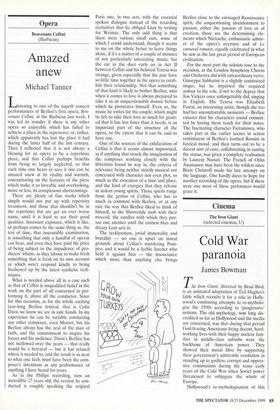Opera
Benvenuto Cellini (Barbican)
Amazed anew
Michael Tanner
Lstening to one of the superb concert performances of Berlioz's first opera, Ben- venuto Cellini, at the Barbican last week, I was led to wonder if there is any other opera so enjoyable which has failed to achieve a place in the repertoire; or, rather, which apparently has lost the place it had during the latter half of the last century. Then I reflected that it is not always a blessing for an opera to be a repertoire piece, and that Cellini perhaps benefits from being so largely neglected, so that each time one hears or sees it one can be amazed anew at its vitality and warmth, concentrating on the features of the piece which make it so loveable and overlooking, more or less, its conspicuous shortcomings.
There are plenty of fine works which simply would not put up with repertory treatment, and those that shouldn't be in the repertoire but are get an ever worse name, until it is hard to see their good qualities. Incessant exposure, which is like, or perhaps comes to the same thing as, the test of time, that inscrutable examination, is something that only a handful of operas can bear, and even they have paid the price of being subject to the impudence of pro- ducers' whims, as they labour to make fresh something that is fresh on its own account or which won't respond kindly to being freshened up by the latest synthetic tech- niques.
What is needed above all in a case such as that of Cellini is unqualified belief in the work on the part of all concerned in per- forming it, above all the conductor. Since for this occasion, as for the whole exciting year-long Berlioz festival, that is Colin Davis we know we are in safe hands. In my experience he can be variable conducting any other composer, even Mozart, but his Berlioz always has the zeal of the man of faith, and the commitment to inspire his forces and his audience. Davis's Berlioz has not mellowed over the years — that really would be a betrayal — but it has relaxed where it needed to, and the result is as near to what one feels must have been the com- poser's intentions as any performance of anything I have heard for years.
As ' in the Philips recording, now an incredible 27 years old, the version he con- ducted is roughly speaking the original Paris one, in two acts, with the essential spoken dialogue instead of the retarding recitatives that he obliged Liszt by writing for Weimar. The only odd thing is that there were various small cuts, some of which I could understand, though it seems to me on the whole better to leave things alone, if it's a matter of a couple of minutes of not particularly interesting music; but the cut in the duet early on in Act H between Cellini and his beloved Teresa was strange, given especially that the pair have so little time together in the opera to estab- lish their relationship. Not that something of that kind is likely to bother Berlioz, who when it comes to love is always prepared to take it as an unquestionable dorm& before which he prostrates himself. Even so, the music he writes for the couple, which might be felt to take their love so much for grant- ed that it has less force than it needs, is an important part of the structure of the opera, to the extent that it can be said to have one.
One of the sources of the exhilaration of Cellini is that it seems almost improvised, as if anything that struck the imagination of the composer working closely with the librettists found its way in, the criteria of relevance being neither strictly musical nor concerned with character nor even plot, so much as the evocation of a time and place, and the kind of energies that they release in ardent young spirits. Those spirits range from the genius of Cellini, who has so much in common with Berlioz, or at any rate the way that Berlioz liked to think of himself, to the Shrovetide mob with their moccoll, the candles with which they pur- sue one another until the cannon fires and dreary Lent sets in.
The recklessness, jovial immorality and brutality — no one is upset on moral grounds about Cellini's murdering Porn- peo, and it would be a feeble listener who held it against him — the insouciance which more than anything else brings Berlioz close to the envisaged Renaissance spirit, the unquestioning abandonment to passion, either the passion of love or of creation, these are the determining ele- ments which Nietzsche, enthusiastic admir- er of the opera's overture and of Le camaval romain, equally celebrated in what he saw as the last great period of European civilisation.
For the most part the soloists rose to the occasion, as the London Symphony Chorus and Orchestra did with extraordinary verve. Giuseppe Sabbatini is a slightly constricted singer, but he imparted the required ardour to the role, if not to the degree that Jon Vickers once unforgettably did, singing in English. His Teresa was Elizabeth Futral, an interesting artist, though she too had her uncomfortable moments — Berlioz ensures that his characters sound commit- ted by having them reach for their notes. The fascinating character Fieramosca, who takes part in the earlier scenes in action reminiscent of Berlioz's loathed Rossini in farcical mood, and then turns out to be a decent sort of cove, collaborating in casting the statue, was given a complete realisation by Laurent Naouri. The French of Orlin Anastassov may have been the wildest since Boris Christoff made his last attempt on the language. One hardly dares to hope for another recording of the opera, but if there were one most of these performers would grace it.






















































































































 Previous page
Previous page